Fatal Friends, Deadly Neighbors and Other True Cases Read online
Page 2
Cox investigated crashes and near-crashes, and all of his jobs involved one aspect of flying or another. He recalls examining the circumstances of a particular collision in Moses Lake, Washington, where navy jet pilots in training routinely practiced low-level, high-speed flying maneuvers.
“A navy A3 jet flying low and at high speed collided with a crop duster. The A3’s right engine impacted the biplane’s left wing, and the propeller of the crop duster scratched and punctured the external fuel tank on the navy plane,” Chuck explained. “Both of the military pilots ejected safely, and the crop duster plummeted to the ground, which was freshly plowed and soft. A local man heard the crash and he was able to pull the biplane pilot out and call for help.
“While I was investigating the accident, some military investigators claimed, ‘That agriculture plane hit our jet.’
“I asked them how a hundred-mile-an-hour crop duster could catch up with and hit a five-hundred-mile-an-hour jet. They didn’t have an explanation for that. I was just happy that all three pilots lived!”
Chuck Cox was always able to keep a level head when he had to, something that is a prerequisite for both a pilot and an air traffic controller. Those jobs, however, involved people he didn’t know well—or at all. They didn’t deal with the people he loved and devoted his life to.
Cox speaks his mind, and he can be stern when he needs to be. Lesser men would have broken long ago—but not Chuck Cox. When he commits to a cause, he is a bulldog and nothing can shake him. His cause now is one that no one on earth would envy.
Before Chuck Cox retired in February 2011, both he and Judy looked forward to a serene life. His father suffered from heart disease, but with a pacemaker, he was expected to live at least ten years. Chuck and Judy and his parents considered creating one household to reduce living costs so both families would be able to travel while they were still young enough to do so. Sadly, events involving Susan Cox Powell, Chuck and Judy’s daughter, would put unbelievable stress on both couples and end their hopes for rewarding retirements.
“My dad died suddenly in January 2011,” Chuck said. “I think what happened to Susan put so much worry on his heart that it killed him. There were so many things that we all needed to say in response to attacks on us—but we couldn’t. We had to remain silent.”
Since the Christmas season of 2009, the Cox family has lived with huge anxiety about Susan, their third daughter. Chuck and Judy have no idea if Susan is alive or dead. She vanished from the Utah home she shared with her husband, Josh, and their two little boys—Charlie and Braden. She had allegedly left home in a blizzard on a frigid Sunday night. There was no word at all from her, no sightings, nothing. She was simply gone.
The circumstances of her vanishing defy any rational explanation. For her family, dealing with them was excruciating. Susan’s parents and sisters wanted to believe that she was alive and would come home again, but as the days and weeks passed, they sought for her in vain. Her case was so bizarre that the search for her spread across America. Dozens of publications, including People magazine, covered the story, which was picked up by the Associated Press. Surely, the Coxes thought, if Susan was able to she would have come forward. In a way, it’s harder for families not to know where someone they love is than it is to accept their death and begin to recover.
Judy, Chuck, and Susan’s sisters were in limbo.
Josh Powell was quite sure that his wife was safe and well, and he reassured those who were baffled and grieving. Indeed, Josh explained that he hadn’t wanted to raise an alarm when Susan left their home on the night of December 6, 2009, because he didn’t want to upset anyone prematurely.
He was positive she was okay, even though she had seemingly disappeared into the whirlwind of snow and ice. Josh appeared to be embarrassed as he confessed that he believed Susan had run off with another man, leaving him alone to care for Charlie and Braden, who were only four and two.
Although the Josh Powells sometimes seemed an unlikely couple, and had their share of problems, most of which they kept between themselves, the idea that Susan would have an affair with another man and desert her family to be with him was mind-boggling.
Susan was a devout member of the Church of Latter-day Saints and she adored her little boys. She believed in her religion’s tenets that marriage was for life—and beyond—and she had fought to save her own union. To everyone who knew her, the thought that she would abandon her children for a sinful affair was unbelievable.
* * *
Susan Cox was a bubbly, happy little girl and she remained that way into adulthood.
She was a romantic who wanted to make the world better—or, in her case, “prettier.” When the Coxes were living in Alaska, and she was four or five, she once used crayons to draw a flower on a newly painted wall. She explained why to her perturbed parents: “I wanted to make it prettier.”
Hearing that, they couldn’t punish her. Chuck cleaned the wall and Susan helped.
In high school, one of her teachers asked her what her philosophy of life was.
“What do you mean?” Susan asked.
“What do you want to do with your life?” the teacher explained. “How do you look at the world?”
“I want people to be pretty,” she said. “So they will be happy.”
After graduation, she attended the Gene Juarez Academy of Beauty in Seattle, preparing for a career in that field. Her dream was to have her own beauty salon one day.
Susan herself was attractive—in a young Debbie Reynolds sort of way. She had bright blue eyes, wavy brown hair, and dimples. Dozens of photographs of her have been published and it’s hard to find one in which she isn’t smiling.
Conversely, there are few pictures of Josh Powell where he is smiling. Once Susan’s goal was to make Josh happy, to help him forget his abusive childhood.
She was sure she could do that.
Like many young Mormon singles in their late teens and twenties, she and her sisters often went to an LDS Stake Center at Twelfth and Pearl streets in Tacoma to interact with their peers in the single adult ward who were eighteen to thirty.
“It was a marriage pool,” Chuck Cox explains. “She met Josh Powell there. She was nineteen and he was twenty-six. We felt he was hunting for someone who believed that the husband was the head of the house. Susan was in love—you know, like the songs ‘I Am Sixteen Going on Seventeen’ or ‘They Tried to Tell Us We’re Too Young.’ She was in love with Josh Powell, and no one could change her mind.”
On the surface, Josh didn’t seem that bad a choice for Susan. He gave the impression that he believed in all the Mormon tenets, and Susan saw him as a very mature “older” man.
While she was very well liked by the group at the Stake Center, Susan was aware that Josh lacked social skills: He had trouble fitting in. That didn’t make her like him less; she actually felt a little sorry for him and tried to draw him into her circle of friends. It wasn’t that Josh was shy; it was more that he talked too much about himself and his many accomplishments, and didn’t seem very interested in other people. His affect was awkward, even a little peculiar. At first, of course, Susan didn’t find him odd.
Chuck and Judy couldn’t understand Susan’s fascination with Josh, and sometimes they argued about it, although they tried not to—aware that the more they criticized Josh, the more their daughter would be attracted to him. She was a teenager and parents’ opinions aren’t usually appreciated at that stage of life.
“I asked her once ‘Why Josh?’ ” Judy Cox recalls, of when Susan started dating him seriously. “And she wouldn’t answer me. I think she wanted to help him.”
Although judging others’ attractiveness is a most subjective position, most people would not describe Josh Powell as prepossessing. Rather than being a handsome, dynamic man, Josh looked like he was no older than sixteen or seventeen. At five feet, ten inches, he was slender and somewhat weak appearing. He had bright blue eyes and rosy cheeks, and scarcely any beard. Even though he
was seven years older than Susan, he looked younger.
Maybe he seemed so full of himself because beneath the surface he felt he didn’t really measure up.
Everything about Josh seemed weak. No one realized then that he was a “control freak.”
But he was.
To her family’s continuing bewilderment, Susan Cox saw something in Josh that others didn’t see. He had originally tried to date Susan’s oldest sister, Mary, who didn’t care for him at all. On the night of one of Mary’s dances—where she had a date with someone else—Josh came over to the Coxes’ home to ask her for a date, unaware that this was totally inappropriate. He hung around her house, waiting for her until she came home. It was an awkward situation.
Mary didn’t want to go out with him, and she was alarmed when his attention turned to Susan. She kept warning Susan about Josh and advised her not to date him; there was just something about him that Mary neither liked nor trusted.
Josh Powell often exaggerated or told outright lies. Susan was so thrilled with her new romance that it never occurred to her to check out some of the things he said. He told Susan and her parents that he had a degree in business administration from the University of Washington. But he complained about his professors, saying that he knew more than any of them did.
Years later, when Nate Carlisle, a Salt Lake City reporter, attempted to verify Josh’s degree from the University of Washington, he found there was no record of it. Josh countered by saying he was on a “special list.” That was a lie, but he would never admit it.
Susan wanted to marry and have a family; her parents had been young when they wed and she had never known anything but a happy home. She was in love with love. When she looked at Josh, she was impressed that he had a job, his own apartment, and his own car. She either didn’t know that he’d lived with his father, Steven Powell, until he was twenty-six—just before they started dating—or it didn’t seem important.
To her, Josh seemed stable and ready to settle down.
“Josh wasn’t stable,” Chuck Cox says. “After ten minutes, anyone could see there was something wrong with him. He talked all the time.”
And it was mostly about himself. He was a braggart, and Susan’s parents didn’t agree with her that all he needed was love. And then he proposed to her.
“I tried to tell her that you don’t marry a ‘project.’ ”
Judy Cox and Susan’s friends threw a bridal shower for her. There weren’t many there—only her friends Rachel, Terry, Jody, and Josh’s sisters Alina and Jennifer. All of a sudden, another person walked into the room. They were all shocked to see that it was Josh. He was wearing a skirt, and lots of makeup, all dressed up as a female.
“He wanted to attend the girls’ bridal shower, and be in the spotlight,” Judy recalls. “It was really odd and embarrassing, and we told him he had to leave.
“When he did, I said to Susan, ‘You’re not going to marry him, are you?’ And Susan was upset.”
Judy remembers seeing “blackness” as the wedding approached and having a “very bad feeling.”
Susan married Josh Powell on April 6, 2001. She chose the Portland LDS temple, in Clackamas County, Oregon. She looked lovely and was thrilled with her beautiful wedding gown. It was white satin with a deep round neckline, fitted bodice, and full skirt. Josh wore a tuxedo and had a white rose in his lapel. Both of them looked very happy.
Outside the temple, plum and cherry trees were in full bloom. A sudden wind scattered the white petals over the grassy lawn as Susan posed in her wedding dress.
Susan’s and Josh’s families hadn’t met each other before the wedding rehearsal. While Chuck and Judy Cox were picking up the wedding expenses at a cost of several thousand dollars, they were shocked to hear Josh’s father, Steve Powell, grousing over the cost of the wedding party’s post-rehearsal meal at the Old Country Buffet, something just over a hundred dollars.
Although Steve and Josh’s mother, Terry, were divorced, they attended the wedding and the wedding reception. Judy and her family had provided the flowers, decorations, wedding cake, and a lavish spread of food. The wedding guests ate heartily, but the cake was only half-gone and there was quite a lot of food left over, too. Even so, Judy Cox was shocked when her daughter’s new mother-in-law asked if she could pack everything in her car to take back to Spokane for the wedding reception she planned for Josh and Susan on the east side of Washington.
“I couldn’t believe it,” Judy recalled. “She wanted it all—from the cake to the decorations to the flowers. I told her no. And she couldn’t understand why!”
The couple had a short honeymoon—one night in the Columbia Gorge Hotel.
Like so many women before her who believe marriage will change a man, Susan felt sure that she could make Josh happy, and that her family would see in Josh what she did.
Josh had held a job for several years. He worked for his father. Steve Powell’s titular employer was the Washington State Department of Corrections, but he actually had nothing to do with the prisoners themselves. He was an “account executive” for the company that sold the furniture that convicts built under the Correctional Industries (CI) program. Their consumers were schools from kindergarten to twelfth grade and nonprofit companies.
Josh was an installer, which meant, basically, that he put legs on school chairs, tables, and desks. He chose the hours that he wanted to work, had complete control of his own time, and worked when he wanted to.
“Two weeks after their wedding,” Chuck Cox remembers, “Josh came to me, wanting to borrow money. I suggested that he either take on more installations or get a better job.”
Josh didn’t follow his father-in-law’s advice. Instead of working harder, he asked the furniture company to pay him mileage. But he went further. He insisted that, legally, they had to pay him for his travel costs from job to job. Instead, they fired him.
“He called them two weeks later,” Chuck says, “to ask them if they missed him! They told him they didn’t, and they were doing just fine without him.”
It is an understatement to say that Josh Powell lacked tact; he had a severe deficit in getting along with people, particularly anyone he worked for. He didn’t appear to have trouble getting a job; his problem was keeping it. He was hired next by the Home Depot. Within a short time, he told his boss he had hurt his back on the job and couldn’t lift heavy items—a big part of his job description—and he also couldn’t resist pointing out things that the Home Depot was doing wrong. Once again, he was fired.
Susan was the one who worked steadily. She was a hairstylist for Super Cuts, and then Regis, and she really liked her job, but she wasn’t making enough to keep them afloat financially.
Josh took a job as a car salesman. He lasted a week before, once again, he was let go.
He and Susan could no longer afford to keep their apartment and they had to move in with Josh’s dad, Steven Powell, for three weeks. Steve had been divorced from his children’s mother, Terry, since the early nineties. Terry and her daughter, Jennifer, were living then in Spokane, but Steve’s other children all lived with him: Josh’s sister, Alina, and his two brothers, John and Michael.
There really wasn’t enough room in Steve Powell’s house for two more people, but he hung a sheet in the dining room to mark off a makeshift room for the recently married couple.
It was an untenable situation for Susan. They had no privacy and the Powells’ living setup was so different from the Coxes’ home. Almost from the beginning, her father-in-law made her nervous. He stared at her and made remarks that seemed much too personal to her, and were full of sexual innuendo.
Susan was relieved when Josh’s next job was at an assisted living facility for the elderly. Both Josh and Susan were in training to be assistant managers. Providentially, the position came with an apartment and three meals a day. The couple qualified because they had no children and no pets. Susan longed to have children but their financial situation was too precarious to think a
bout it for a while. And she was only nineteen; there was time.
At last, she and Josh had some privacy and she was happy to get away from her father-in-law’s creepiness. After their training, Susan and Josh were assigned to a home for the elderly in Yakima, Washington. Susan hoped that the assisted living field might be a niche where Josh would fit in. She got high praise from the company but he didn’t. Two months later he was out of a job again, and they had to move.
Susan grew alarmed as she realized that her bridegroom simply could not get along with people, especially anyone in authority. He complained and criticized his bosses until he was let go. His résumé was a mishmash of short-term positions.
Josh clearly needed to be in control, and he felt most of his jobs were beneath a man with his intelligence and education. A lot of men in their twenties go through the same thing, but they learn to bite their tongues and learn as much as they can on a job in the hope that they can move up.
Every place they moved in Washington State, Susan got along fine. People liked her, and she was able to keep her job with Regis. But she had had to resign when she and Josh were sent to their new—if short-lived—positions in Yakima. It was Josh’s third try—and the company owners finally deemed him “untrainable.”
Then they had to move to Oregon for training seminars on his next job. “He insisted that Susan stop cutting hair and follow him wherever he moved,” her father said. “But Josh went to the Oregon seminar and began to tear down management in front of those attending. And of course he got fired again.”
Even if Josh Powell had taken only a few courses in business administration at the University of Washington, it was obvious that nothing had sunk in. He was at an entry level in all of his short-lived jobs, but he could not keep his mouth shut. His own ego was his stumbling block, and he acted as if he were smarter than anyone.

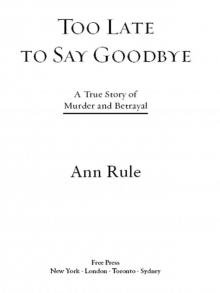 Too Late to Say Goodbye: A True Story of Murder and Betrayal
Too Late to Say Goodbye: A True Story of Murder and Betrayal Green River, Running Red
Green River, Running Red Bitter Harvest
Bitter Harvest Dead by Sunset: Perfect Husband, Perfect Killer?
Dead by Sunset: Perfect Husband, Perfect Killer?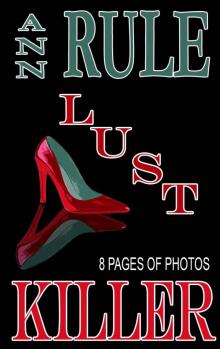 Lust Killer
Lust Killer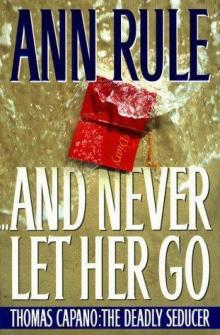 And Never Let Her Go: Thomas Capano: The Deadly Seducer
And Never Let Her Go: Thomas Capano: The Deadly Seducer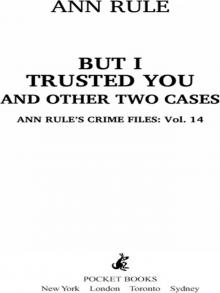 But I Trusted You and Other True Cases
But I Trusted You and Other True Cases Smoke, Mirrors, and Murder and Other True Cases
Smoke, Mirrors, and Murder and Other True Cases If You Really Loved Me
If You Really Loved Me Kiss Me, Kill Me and Other True Cases
Kiss Me, Kill Me and Other True Cases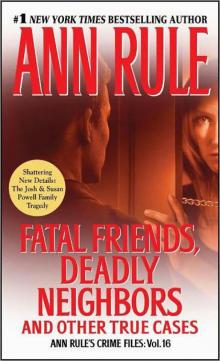 Fatal Friends, Deadly Neighbors and Other True Cases
Fatal Friends, Deadly Neighbors and Other True Cases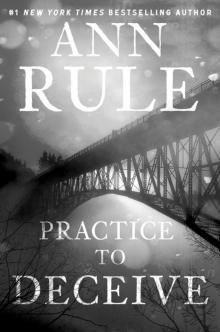 Practice to Deceive
Practice to Deceive Mortal Danger and Other True Cases
Mortal Danger and Other True Cases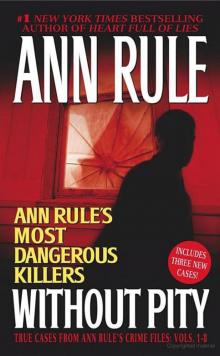 Without Pity: Ann Rule's Most Dangerous Killers
Without Pity: Ann Rule's Most Dangerous Killers Everything She Ever Wanted
Everything She Ever Wanted A Fever in the Heart and Other True Cases
A Fever in the Heart and Other True Cases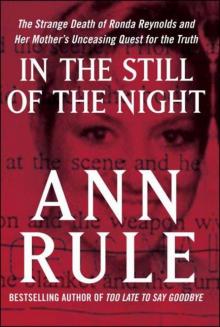 In the Still of the Night
In the Still of the Night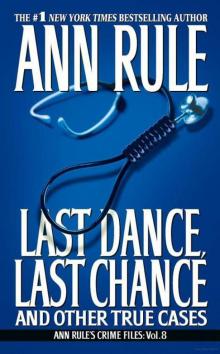 LAST DANCE, LAST CHANCE - and Other True Cases
LAST DANCE, LAST CHANCE - and Other True Cases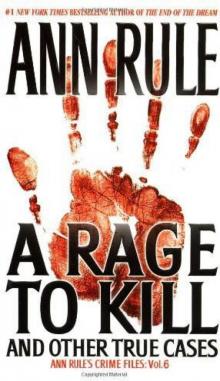 A Rage to Kill
A Rage to Kill The I-5 Killer
The I-5 Killer The Stranger Beside Me
The Stranger Beside Me Everything She Ever Wanted: A True Story of Obsessive Love, Murder, and Betrayal
Everything She Ever Wanted: A True Story of Obsessive Love, Murder, and Betrayal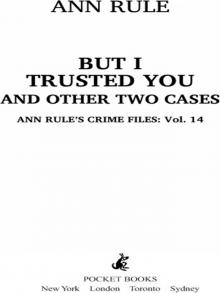 But I Trusted You
But I Trusted You Without Pity
Without Pity Kiss Me, Kill Me
Kiss Me, Kill Me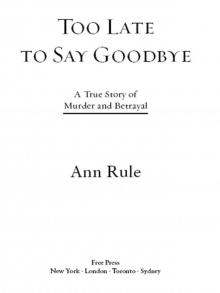 Too Late to Say Goodbye
Too Late to Say Goodbye Lying in Wait
Lying in Wait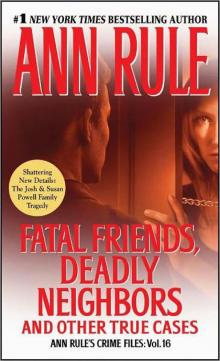 Fatal Friends, Deadly Neighbors
Fatal Friends, Deadly Neighbors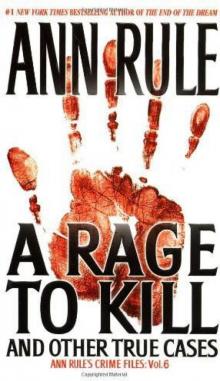 A Rage to Kill: And Other True Cases
A Rage to Kill: And Other True Cases And Never Let Her Go
And Never Let Her Go Lying in Wait Ann Rule's Crime Files Vol.17
Lying in Wait Ann Rule's Crime Files Vol.17 Blood Secrets: Chronicles of a Crime Scene Reconstructionist
Blood Secrets: Chronicles of a Crime Scene Reconstructionist No Regrets
No Regrets Mortal Danger
Mortal Danger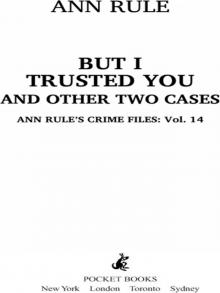 But I Trusted You: Ann Rule's Crime Files #14
But I Trusted You: Ann Rule's Crime Files #14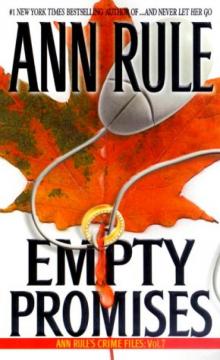 Empty Promises
Empty Promises Dead by Sunset
Dead by Sunset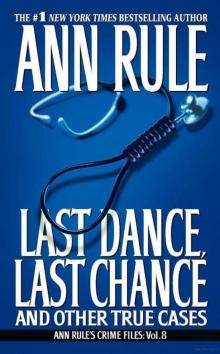 Last Dance, Last Chance
Last Dance, Last Chance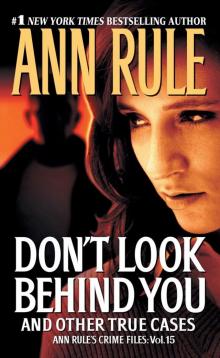 Don't Look Behind You
Don't Look Behind You